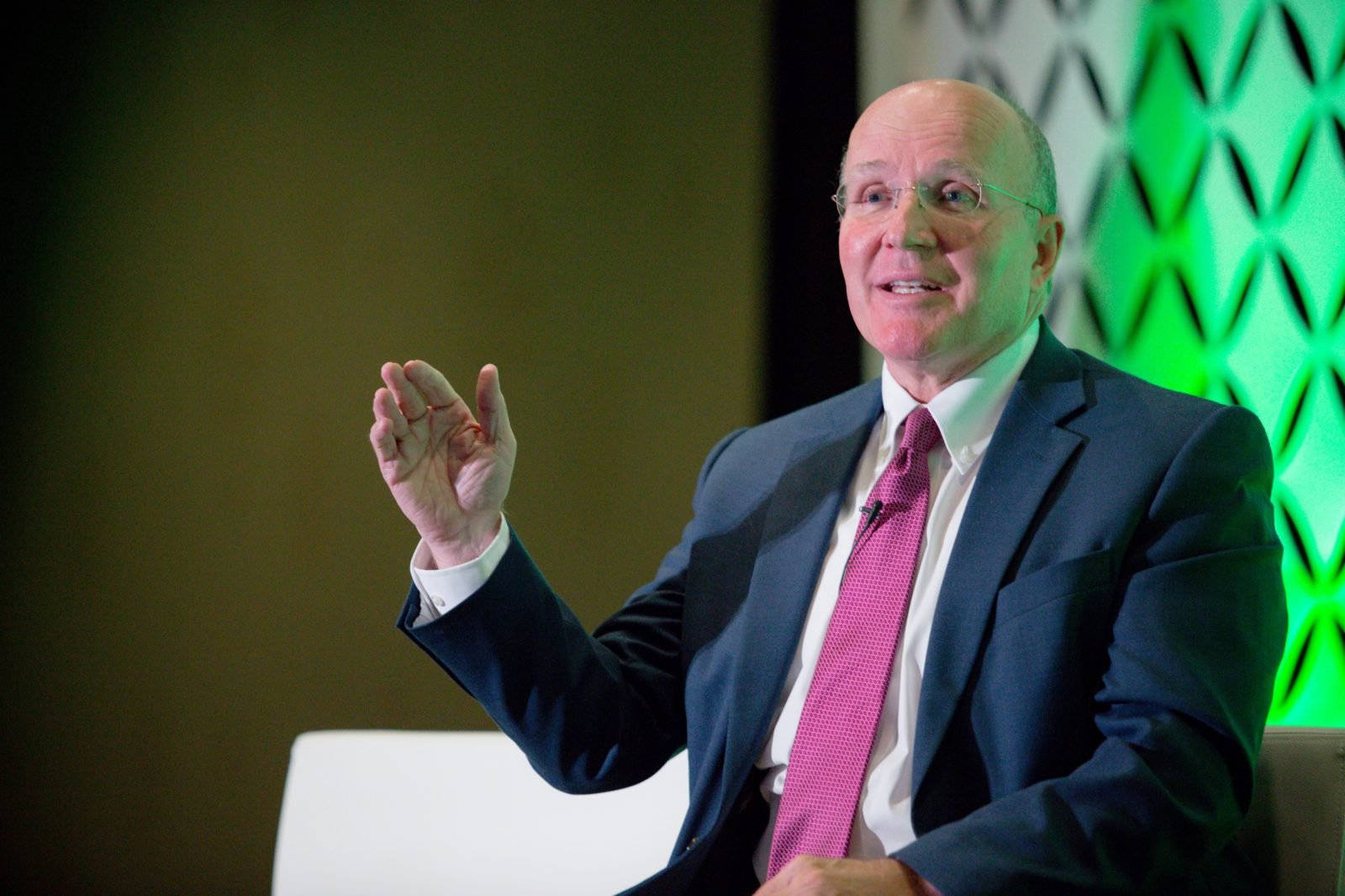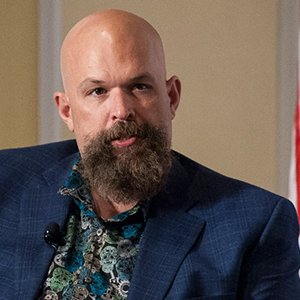Ron and Ed were honored to welcome Virginia Postrel, author of The Fabric of Civilization: How Textiles Made the World. Virginia is also a columnist and speaker whose work spans a broad range of topics, from social science to fashion, concentrating on the intersection of culture, commerce, and technology. Writing in Vanity Fair, Sam Tanenhaus described her as "a master D.J. who sequences the latest riffs from the hard sciences, the social sciences, business, and technology, to name only a few sources."
Ed Questions: Segment One
Welcome to The Soul of Enterprise: Business in the Knowledge Economy, sponsored by Sage, transforming the way people think and work so their organizations can thrive. I’m Ed Kless with my friend and co-host, Ron Baker, and folks on today's show, we are honored to have our interview with Virginia Postrel. Let's do the formalities here and welcome Virginia Postrel, who is an award-winning journalist and independent scholar, a columnist for Bloomberg Opinion. She previously served as columnist for The Wall Street Journal, the Atlantic, The New York Times, and Forbes. She has authored highly acclaimed books, The Substance of Style, The Power of Glamour, The Future and Its Enemies, and the book we're going to talk about mostly today, The Fabric of Civilization: How Textiles Made the World.
Welcome to The Soul of Enterprise, Virginia Postrel. I became obsessed with this book around Thanksgiving. And I'm going to tell you a story. We have at Thanksgiving, we were able to go over to my in-law's house despite COVID which we're very excited about. And we have a tradition in the family that everybody goes around and says something that they're thankful for, which is very nice. Usually people say the usual, family and all kinds of stuff like that. Well, I said fabrics. And that got uproarious laughter from the dinner table. But Virginia, I really want to know, I think we should be. Why should we be thankful for textiles?
And later in the book, you have one of my favorite quotes, which is “We suffer textile amnesia, because we enjoy textile abundance.”
It really starts with thread, doesn't it? That's kind of the basis for it. So talk a little bit about the origins of thread.
And it's so interesting, you wonder what possessed somebody say, “If I do this, I'm going to get this long piece of whatever, right? I mean, where do we even start with that, that's the thing that amazed me?
And that's unbelievable. At one point you say a queen size sheet is 37 miles worth of thread. Stretching you from the Washington Monument to Baltimore.
Quickly, I wanted to just tell you this, I actually worked for a sheet producer at one time, I did their software installation. And one of the things that these guys told me was always buy irregular [sheets]. And the reason is, there's actually no difference between irregular sheets and regular sheets, except every so often we put like on 20% of them, we just say they're irregular. And those never come back. But the other ones we guarantee. But there's no quality control.
So I have so many questions, we’ve only got about two minutes left in this segment. What's the relationship of textiles to mathematics?
And the really fundamental algorithms built in the looms. So the first algorithms, you say, were those that were produced at the loom?
Which is actually the same way I believe that computers ultimately do division. That's how it works out in machine language. Anyway, we're already done with our first segments, it’s flying by.
Ron’s Questions: Segment Two
Welcome back, everybody. We're here with Virginia Postrel, one of my favorite authors, and Virginia, if you would have told me at any point that I would read a book about sewing and weaving and fabrics, I would have said you're nuts. But your book just held my interest the whole time. It's just a great, great story. And you're so right that we take this for granted.
Well the link between dyeing and chemicals was absolutely fascinating. Just by itself. You're right. This is a business book, really. In many dimensions.
Your discussion about how textiles were used for money, and the sumptuary laws, ff course, were absolutely fascinating, too. I love the line about how husbands used them as an excuse not to buy a nice wardrobe for their wives.
That's awesome. Well, you've convinced me that we should no longer call it the Stone Age, it should be called the String Age.
One of the most fascinating stories in the book, it just blew my mind. Ed and I have done a few shows on the history of medicine, surgery, anesthesia, and germ theory. Explain the link between silkworms dying which led to germ theory.
It makes sense because so many other things came out of thinking about all of this, such as dyeing and chemicals, polyester and nylon, and all of that.
That was an incredible story. So unfortunately, we're at our break, this is just flying by, Virginia.
Ed’s Questions: Third Segment
We are back on The Soul of Enterprise with Virginia Postrel. Her book is The Fabric of Civilization: How Textiles Made the World, and folks, I can't recommend this book enough, please go get it and read it. It's a great story. And we're only scratching the surface with Virginia today on what's in this book. And Virginia, I want to ask you a little bit about your process of writing this book, because it is so deep and so rich, was it like a term paper, like note cards? I have this vision of you having note cards all over your dining room table to try to put this together?
Do you use Microsoft Word, type it out, and then edit from there?
It’s just a fantastic book. And I love the fact that you include links to YouTube videos, because in many cases. I must have watched half a dozen videos that you recommended in your book, because you want to see, okay, this drop spindle thing that you're talking about, you really have to see that to fully appreciate it.
Well, I've got about five minutes left, I want to ask you a very specific question. And that is did you come across a song called “The work of the weavers” in your travels?
The Clancy Brothers did a version of it. It’s actually a Scots tune. I'm going to give you a little bit of a sample right now, are you're ready?
[Ed sings a part of this song. The printed word can’t do it justice—a must listen!]
And of course the weavers got themselves into a pinch, because…tell that story…
And maybe this is apocryphal. But the saboteurs, wasn't that a similar story, the sabo, with the shoes and such.
I think Don Boudreaux has something on it and that's where I remember reading it. But the last question I have for you is about your Afterword, which is really an essay that can stand on its own. It's just such a great piece. I'm curious, was there a rationale for putting it as an Afterword versus a Foreword, because you could almost argue that it would have set you up for the whole book? I was just curious about that.
It's a magnificent piece. But it can stand on its own as a tease for the book, because it really leaves you with all of these dangling questions. Well, Virginia, thanks so much for appearing. Ron is going to take you the rest of the way home the last 15 minutes. But I just want to thank you for coming on the show today. This is just a great honor for me. And as I said, I was obsessed with the book. So just a lot of fun to talk to you.
Ron’s Questions: Fourth Segment
Welcome back, everybody. We're here with Virginia Postrel, and Virginia, another book of yours, I absolutely loved was The Substance of Style, which came out in 2003. In there, you talk about Maslow's hierarchy of needs. And everybody talks about this like it's Gospel, the Oracle of Truth. But you don't think it's a good explanation?
It’s like you say, you don't have to wait to have a full stomach or until your roof doesn't leak. The poor built cathedrals, and made pottery and jewelry. It's a really, really excellent point. The other thing I wanted to ask you, and another book of yours that I absolutely loved because, well, for one thing, you signed it for me, it's behind me, is The Future and Its Enemies. And we're going to link to all of your books, and more, on our show notes. But you write in the Introduction to that book, “The central question of our time is what to do about the future? And that question creates a deep divide.” Is that still true?
No, that's really true. It reminded me very much, the whole theme of the book, of Jane Jacobs. She wrote a lot about that bottom-up, trial-and-error process. Hayek, obviously, and George Gilder was another one who I thought of a lot. It's a fantastic book. The other thing I liked that you pointed out is Al Gore wrote Earth In the Balance but the earth doesn't have an equilibrium. There's no static standard for natural.
You wrote very eloquently articles in The Atlantic and on your blog about donating a kidney to an acquaintance, I think back in 2006. And I am, of course, interested in your ideas about the waiting list, how many people die waiting for a kidney and what a tragedy that is. But just that whole process, you talk about how the process is really difficult for the donor?
“Here’s Looking at You, Kidney,” June 2006
“The surgery was simple; the process is another story,” October 23, 2006
“With Functioning Kidneys for All,” The Atlantic, July 2009
It’s laparoscopic surgery, right?
I take it you support a market for kidneys?
I think Iran is the only country that allows that legally?
Well, Virginia, thank you so much. This has been such an honor to be able to talk with you. I'm really excited. And love your books. And we'll put up full show notes, where to contact you, and all the other stuff that we talked about. Ed, what do we have on store for next week?
Ed
Next week, Ron, we're going to be talking about our Best Books of 2020. And you may hear about this one again.
Ron
Excellent. I'll see you in 167 hours.
Bonus Content is Available As Well
Did you know that each week after our live show, Ron and Ed take to the microphone for a bonus show? Typically, this bonus show is an extension of the live show topic (sometimes even with the same guest) and a few other pieces of news, current events, or things that have caught our attention.
This week is Bonus episode 325 - GameStop, Please STOP!. Here are just a few links discussed during the bonus episode:
Covid-19 Vaccine Rollout Is Being Slowed by Too Many Government Rules - Bloomberg
Pandemic has "wiped out ten years of progress in older industrial Britain" - New report | Bdaily
Carlsbad, CA Says No More to Lockdowns. May It Be a National Model! | RealClearMarkets
Dismiss All the Populist GameStop Hype: Short Sellers Are Heroes – AIER
Click the “FANATIC” image to learn more about pricing and member benefits.










